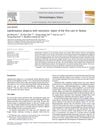 23 citations,
February 2021 in “Journal of Endocrinological Investigation”
23 citations,
February 2021 in “Journal of Endocrinological Investigation” Betacoronaviruses, like COVID-19, may cause hormone system dysfunction and affect disease susceptibility and severity.
[object Object]  17 citations,
April 2016 in “Journal of Investigative Dermatology”
17 citations,
April 2016 in “Journal of Investigative Dermatology” KB2115 (eprotirome) can safely extend the hair growth phase without damaging cells or changing hair color.
 2 citations,
January 2002 in “Hormone Research in Paediatrics”
2 citations,
January 2002 in “Hormone Research in Paediatrics” Molecular diagnostics help identify genetic defects causing endocrine diseases, improving diagnosis and treatment options.
 1 citations,
May 2006 in “Thyroid Research and Practice”
1 citations,
May 2006 in “Thyroid Research and Practice” Skin can become dry and thick in hypothyroidism.
 7 citations,
July 2019 in “International archives of internal medicine”
7 citations,
July 2019 in “International archives of internal medicine” Common skin conditions can greatly affect a person's mental health and social life.
 1 citations,
May 1965 in “Medical Clinics of North America”
1 citations,
May 1965 in “Medical Clinics of North America” Hair growth dysfunction involves various conditions with limited treatment options.
 July 2003 in “British Journal of Dermatology”
July 2003 in “British Journal of Dermatology” Some skin conditions are associated with other serious diseases, and office microscopy may miss many fungal infections.
 35 citations,
November 1931 in “Journal of Genetics”
35 citations,
November 1931 in “Journal of Genetics” Hairless mice lack fur due to a genetic mutation affecting skin response, not hormone issues.
 1 citations,
March 2011 in “Infertility”
1 citations,
March 2011 in “Infertility” Hormone imbalances from the pituitary, thyroid, and adrenal glands can cause infertility, but treating these disorders can improve fertility.
 128 citations,
September 2011 in “British Journal of Dermatology”
128 citations,
September 2011 in “British Journal of Dermatology” Obesity is linked to various skin problems and may increase the risk of skin cancer.
3 citations,
March 2012 in “Journal of the Egyptian Public Health Association /Journal of the Egyptian Public Health Association” General practitioners in Qassim have satisfactory knowledge of alopecia areata but need more education to address gaps and misconceptions.

Skin changes can help predict thyroid diseases.
 68 citations,
May 2021 in “Endocrine”
68 citations,
May 2021 in “Endocrine” People with diabetes or obesity should manage their conditions carefully as they have a higher risk of severe COVID-19.
 1 citations,
February 2018 in “InTech eBooks”
1 citations,
February 2018 in “InTech eBooks” PCOS in lean women is a serious health condition with implications beyond fertility, affecting metabolism and increasing cardiovascular disease risk.
8 citations,
September 2005 in “Practical diabetes” PCOS is a condition causing irregular periods, excess male hormones, and infertility, often managed by targeting insulin resistance and specific symptoms.
317 citations,
April 2018 in “Journal of steroid biochemistry and molecular biology/The Journal of steroid biochemistry and molecular biology” PCOS is a complex condition in women that can lead to health issues, and lifestyle changes are the best management approach.
 19 citations,
January 2011 in “Clinics”
19 citations,
January 2011 in “Clinics” A young woman with a rare hair loss condition improved with steroid and biotin treatment.
 165 citations,
January 2014 in “Dermatology Research and Practice”
165 citations,
January 2014 in “Dermatology Research and Practice” Zinc is effective for treating various skin conditions, including warts and acne.
 6 citations,
June 2022 in “Frontiers in Psychiatry”
6 citations,
June 2022 in “Frontiers in Psychiatry” Many patients with various medical conditions experience anxiety, which worsens their quality of life and raises healthcare costs.
4 citations,
October 2018 in “Journal of drug delivery and therapeutics” Hansraj is effective for various health issues but should not be used during pregnancy.
 15 citations,
April 2019 in “Best Practice & Research Clinical Endocrinology & Metabolism”
15 citations,
April 2019 in “Best Practice & Research Clinical Endocrinology & Metabolism” Polycystic Ovary Syndrome (PCOS) in teenagers is a complex condition linked to genetics and environment, often associated with obesity and insulin resistance, and is treated with lifestyle changes and medication.
[object Object]  2 citations,
January 2021 in “JAAD Case Reports”
2 citations,
January 2021 in “JAAD Case Reports” Using a special laser and skin medication together successfully cleared a skin condition in a pregnant woman.
 75 citations,
October 1996 in “Dermatologic Clinics”
75 citations,
October 1996 in “Dermatologic Clinics” Chronic Telogen Effluvium is a hair loss condition in middle-aged women that usually doesn't lead to complete baldness.

The case shows the difficulty in diagnosing certain conditions when standard tests are negative.
 1 citations,
October 2000 in “Pediatrics in Review”
1 citations,
October 2000 in “Pediatrics in Review” The document says that hookworms are treated with mebendazole and stress-related hair loss usually gets better in 6 months, while other hair loss types have specific treatments.
 3 citations,
November 2015 in “Endocrinology, Diabetes & Metabolism Case Reports”
3 citations,
November 2015 in “Endocrinology, Diabetes & Metabolism Case Reports” Ring Chromosome 11 may be linked to conditions like early puberty, excessive hair growth, hair loss, and type 2 diabetes.
 35 citations,
January 1996 in “Dermatologic clinics”
35 citations,
January 1996 in “Dermatologic clinics” Tinea capitis is a common scalp infection causing hair loss, mostly in young children.
 2 citations,
January 2019 in “Elsevier eBooks”
2 citations,
January 2019 in “Elsevier eBooks” Biotin supplements are unnecessary for most people but may help with certain conditions like biotin deficiency, brittle nails, and some hair loss.
 2 citations,
March 2011 in “Dermatologica Sinica”
2 citations,
March 2011 in “Dermatologica Sinica” Taiwan reported its first case of a rare scalp condition with no clear cause or treatment.
 July 2023 in “The Egyptian Journal of Hospital Medicine ”
July 2023 in “The Egyptian Journal of Hospital Medicine ” Alopecia areata is a hair loss condition caused by immune factors and can be treated with JAK inhibitors.

























